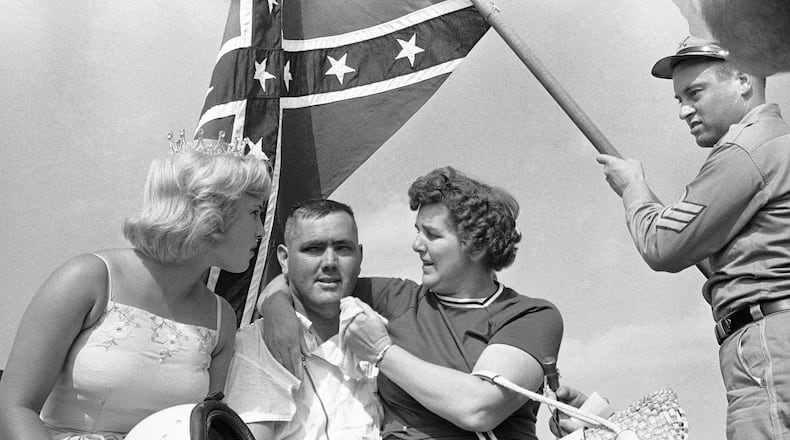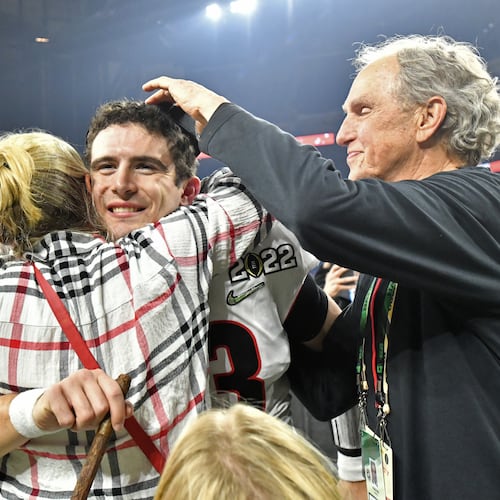I’m looking at a 1962 black-and-white photo from the winner’s circle of the Southern 500 in Darlington. Junior Johnson — the “Last American Hero” as author Tom Wolfe labeled him — has just won and it is time to pose. The result is the very picture of NASCAR’s roots, frozen as an almost cartoonish cliché here in 2020 AD.
There is the one-time moonshine whiskey-runner, flanked on one side by his sister and on the other by a beauty queen. Behind him stands some citizen of these still United States playing dress-up as a Confederate soldier. He’s proudly holding a battle flag of secession and sedition as a backdrop to victory.
Thankfully this was only a scene from a South Carolina racetrack and not the Appomattox Court House.
I’m looking at another photo now, as recent as yesterday. It is of a race car at rest before a night run at Martinsville, Va. Not just any car, this one bears one of the sacred numbers of the sport, No. 43. Both the number and the car belong to Richard Petty, King Richard to his subjects, one of the goodest of good ol’ boys ever to take a checkered flag. And he did that 200 times.
This night, the No. 43 Richard Petty Motorsports Chevrolet, driven by the only African American in any drivers’ meeting he’s in — Bubba Wallace — finished 11th.
That wasn’t the story. The paint scheme was. Done up in black, the car featured in large lettering across its body “Black Lives Matter.” And across the grill were the words: “Compassion, Love, Understanding.”
If there is any possible debate as to which of those two images is the most inspiring, which most culturally worthy, I really don’t want to hear it.
Credit: Steve Helber
Credit: Steve Helber
On Wednesday, NASCAR stated that the Confederate flag was no longer welcome on any of its properties. That flag from a lost and horrid cause has been part of racing campsites from the beginning. At places such as Darlington and Talladega they would decorate a horizon. And every time I'd pass by them on the way to an infield media center and try to pretend they weren't there. It was this slight, persistent discomfort, like going to every race wearing shoes one size too small. That's on me for not speaking more loudly to that.
After a white supremacist massacred nine souls in a Charleston church in 2015, NASCAR moved to discourage fans from unfurling the Confederate flag. That flag “belongs in the history books and that’s about it,” declared the sports marquee name at the time, Dale Earnhardt Jr. But there the movement stalled, and while the flag was not as ubiquitous as before, it remained part of racing’s wallpaper.
Now, in the wake of George Floyd’s death beneath the knee of a white Minneapolis cop, NASCAR went to an outright ban.
The issue is moot now as fans are barred from the track because of the coronavirus restrictions. But they’ll start trickling back soon — Talladega hopes to allow in 5,000 folks June 21 — and enforcement of the flag ban is going to be tricky.
You think those who have held on to that symbol for a lifetime will go along happily with this decree? It’s about heritage not hate, you know, which is always easy to say for those whose heritage doesn’t include being owned by another human.
Glad I’m not the one in charge of telling that group their beloved symbol is an embarrassment that, like all deep guilt, is better kept hidden.
More than any flag flap, there are meaningful, important elements to the wave of anger and soul-searching sweeping over us now. Don’t let this minor conversation hijack bigger ideas.
And there’s that part of me that believes the freedom of expression does extend to the right of anyone to appear insensitive, narrow-minded and even bigoted by the banners they fly. Although, it doesn’t seem to be speaking so loudly to me at present.
There will be fans who bail on racing as a result of this decision, as if their loyalty was based on their prerogative to be Johnny Reb for a weekend.
All that’s to be said at this point is: That’s fine. Just stop coming. Stay home and stew over how racin’ has abandoned its core and how the sport has turned its back on its roots, tangled as they are.
Go ahead, get bitter rather than better.
And here’s hoping the sport is strong enough to survive its good intentions.
About the Author
The Latest
Featured




